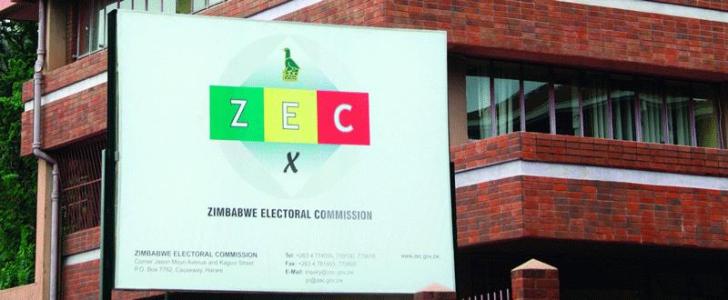News / National
Zec pushes for political party registration
03 Oct 2024 at 07:55hrs |
2 Views

The Zimbabwe Electoral Commission (ZEC) has ramped up efforts to ensure that political parties are legally registered through an amendment to the Electoral Act. Currently, political parties only need to notify the electoral body of their existence without undergoing a rigorous registration process.
In an interview this week, ZEC Chief Elections Officer Utloile Silaigwana emphasized that the registration of political parties was among the key recommendations from the recently concluded annual conference in Nyanga, which reviewed the post-2023 harmonized elections.
"The Zimbabwe Electoral Commission would like to express its gratitude to stakeholders for the successful conduct of the post-2023 harmonized elections review conference," Silaigwana stated.
"The goal of the conference was to reflect on the 2023 harmonized elections in order to adequately prepare for the 2028 electoral cycle. The overarching guiding questions interrogated what worked well and what did not."
Silaigwana highlighted that the conference produced several recommendations aimed at improving the legal and administrative frameworks governing elections. He expressed hope that the recommendation for the registration and regulation of political parties would be incorporated into the electoral law.
He urged political parties to move beyond grievances from the 2023 elections and focus on the upcoming 2028 electoral cycle.
"The commission urges all Zimbabweans to move on from the 2023 harmonized elections and focus on the 2024-28 electoral cycle. Those with grievances are encouraged to seek redress through appropriate forums such as Parliament and the courts," he said. "The commission reserves its right to seek redress in the face of blatant allegations leveled against it."
However, some political figures have voiced concerns over the proposed changes. Citizens Coalition for Change (CCC) spokesperson Promise Mkwananzi welcomed the move, stating that the registration of parties could help resolve disputes regarding leadership within political entities. He added, "We await the proposed modalities. What we want is an enabling environment for multiparty democracy and an end to the stealing of [Nelson] Chamisa's parties by ZANU-PF stooges and mercenaries."
Mkwananzi insisted that all members of Parliament and councillors elected through Chamisa's ticket must be accountable to his party, and political finances should be duly disbursed. "If the registration achieves this end and removes any chance for the masquerades, then it will be desirable," he said. He cautioned against a registration process that could stifle rather than promote multiparty democracy.
Movement for Democratic Change (MDC) presidential spokesperson Lloyd Damba acknowledged that the registration of political parties is not inherently problematic but argued that it should not fall under ZEC's mandate. "In other countries within Africa, we have similar laws that require the registration of political parties, particularly in Kenya. I do not see anything wrong with that particular move," he said.
However, Damba expressed concern about ZEC advocating for such registration, suggesting it was beyond their constitutional mandate. "They want politics to be a game for the rich, particularly those who are looting mineral resources and tenderpreneurs," he cautioned.
The proposed amendments to the Electoral Act are expected to spur discussions around the regulation of political parties in Zimbabwe as the nation prepares for the next electoral cycle.
In an interview this week, ZEC Chief Elections Officer Utloile Silaigwana emphasized that the registration of political parties was among the key recommendations from the recently concluded annual conference in Nyanga, which reviewed the post-2023 harmonized elections.
"The Zimbabwe Electoral Commission would like to express its gratitude to stakeholders for the successful conduct of the post-2023 harmonized elections review conference," Silaigwana stated.
"The goal of the conference was to reflect on the 2023 harmonized elections in order to adequately prepare for the 2028 electoral cycle. The overarching guiding questions interrogated what worked well and what did not."
Silaigwana highlighted that the conference produced several recommendations aimed at improving the legal and administrative frameworks governing elections. He expressed hope that the recommendation for the registration and regulation of political parties would be incorporated into the electoral law.
He urged political parties to move beyond grievances from the 2023 elections and focus on the upcoming 2028 electoral cycle.
However, some political figures have voiced concerns over the proposed changes. Citizens Coalition for Change (CCC) spokesperson Promise Mkwananzi welcomed the move, stating that the registration of parties could help resolve disputes regarding leadership within political entities. He added, "We await the proposed modalities. What we want is an enabling environment for multiparty democracy and an end to the stealing of [Nelson] Chamisa's parties by ZANU-PF stooges and mercenaries."
Mkwananzi insisted that all members of Parliament and councillors elected through Chamisa's ticket must be accountable to his party, and political finances should be duly disbursed. "If the registration achieves this end and removes any chance for the masquerades, then it will be desirable," he said. He cautioned against a registration process that could stifle rather than promote multiparty democracy.
Movement for Democratic Change (MDC) presidential spokesperson Lloyd Damba acknowledged that the registration of political parties is not inherently problematic but argued that it should not fall under ZEC's mandate. "In other countries within Africa, we have similar laws that require the registration of political parties, particularly in Kenya. I do not see anything wrong with that particular move," he said.
However, Damba expressed concern about ZEC advocating for such registration, suggesting it was beyond their constitutional mandate. "They want politics to be a game for the rich, particularly those who are looting mineral resources and tenderpreneurs," he cautioned.
The proposed amendments to the Electoral Act are expected to spur discussions around the regulation of political parties in Zimbabwe as the nation prepares for the next electoral cycle.
Source - newsday
Join the discussion
Loading comments…



























